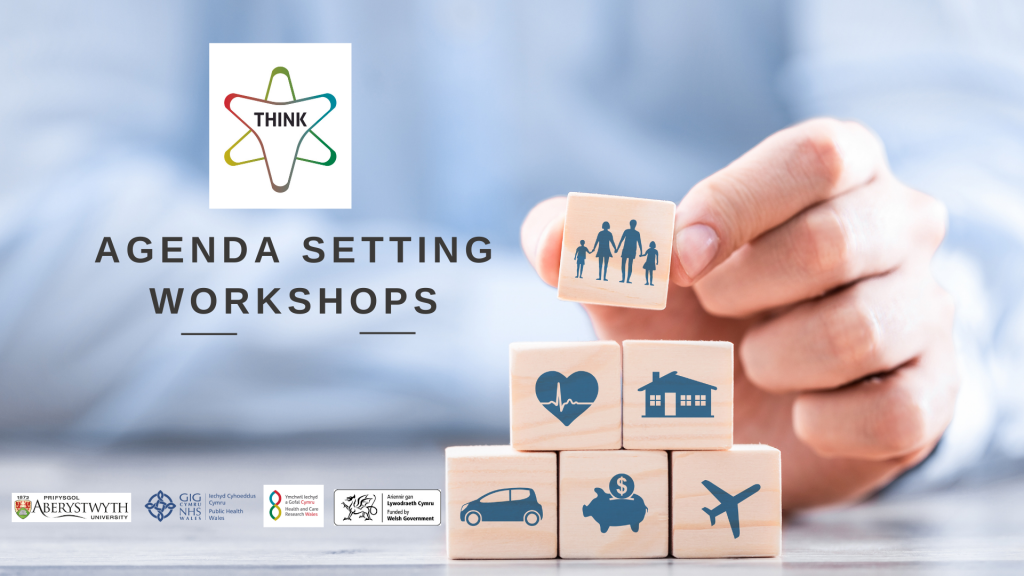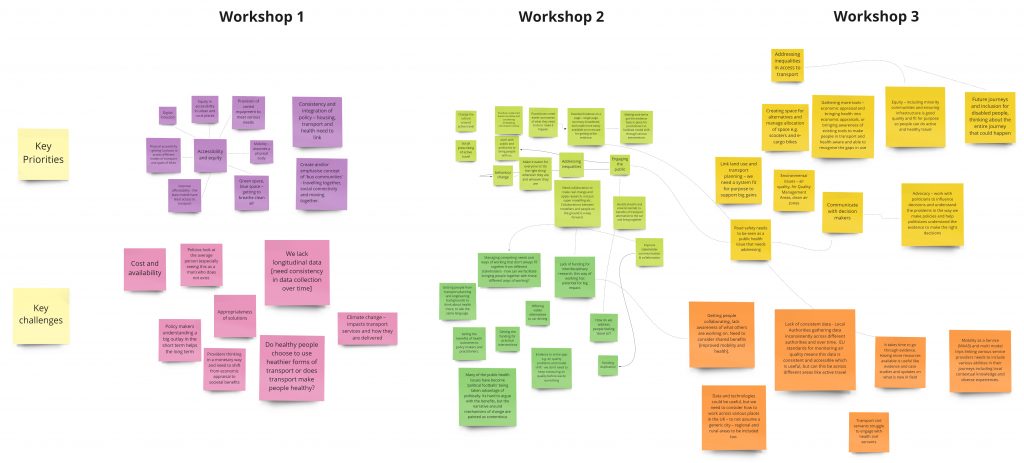THINK held a series of workshops in the Spring that brought together stakeholders working in transport and health. The purpose of the workshops was to help steer strategic decisions about where to invest time and resources in THINK depending on stakeholder needs and interests, priorities and barriers identified, and the kind of changes considered necessary to make a positive impact on public health. In doing so, the workshops set out to identify areas, topics, policies, or interventions that the network will develop. The workshops were designed to explore how to go about future activities and to see if we could generate outputs in themed strands of work where projects are undertaken in sub-groups, supported by THINK.

Exploring priorities and challenges in transport and health
In the first exercise we asked participants to discuss priorities and challenges in transport and health. The following themes were identified:
Priorities
- Making transport and places more equitable and inclusive, which is aligned with the need to reduce health inequalities
- Increasing opportunities to collaborate and improving collaboration as a practice
- Raising awareness of the impact of transport on health and effective evidence-based solutions by communicating these to diverse audiences to influence change
- Identifying research opportunities, increasing and standardising data collection, and improving tools for decision-making
Challenges
- Difficulty collaborating (e.g. using funding, communication challenges, lacking awareness of different ongoing work, inconsistent approaches)
- Norms in researching travel behaviour and appraising transport interventions reproduce inequalities in accessibility to transport and places
- There is often inadequate or inconsistent data
- Communicating with the public and realising behaviour change
- Time and resource constraints
- Policy-action and evidence-action gaps

Lie of the land
The second activity was designed to broaden our understanding of what people are doing now to tackle the challenges in transport and health that were raised in the first activity. Many relevant policies are now recognising the need to adjust transport, travel behaviour, accessibility of services, communities, and places to improve public health while also addressing the environmental impact of the movement of people and goods. Other reflections included:
- Achievements of third-sector organisations
- International institutions recognising and raising awareness of the impact of transport on public health globally
- In the UK, local health boards are proactively communicating with the public to improve air quality and healthier mobility
- The Welsh Government are reducing Wales’s national speed limit in built up areas
- National public health institutions are becoming increasingly proactive in influencing transport planning
Moving from here to there
The third activity sought to identify areas that THINK (as a collective) could work on relating to the priorities and challenges raised. Some suggestions were repeated in more than one workshop, and it was clear there were areas that should be incorporated into a strategic plan for THINK over the next two years. These include:
- Enabling a more joined-up approach
- Capturing the social benefits of investment in transport
- Including groups of people currently marginalised in society through lack of appropriate provision of transport services and suitable infrastructure
- Increasing access to evidence
- Improving skills in communicating with the public
- Developing and improving national standards on transport, built environment and accessibility design and data-collection
Individual ideas were also raised, some of which could contribute to activities within themed sub-groups or developed within THINK, such as setting up and trialling Citizen Assemblies, social prescribing of active travel, or exploring the role of local health and wellbeing boards.
Some of the feedback we received following the workshops included:
“An excellent opportunity to engage and create something truly interdisciplinary“.
Future THINK actions
We have developed a set of actions the core THINK team can support outlined at the end of the full-length summary report. The workshops have highlighted the need for THINK to support collaborative practice, to help foster the conditions for sub-groups to begin their own practice, to ensure transport, health and places are becoming more equitable, to support easy access to resources and raise awareness of transport and health issues and interventions to facilitate change.
Along with pre-planned activities, such as public engagement, releasing small grants to support research and knowledge exchange activities, the THINK team will begin to develop a community of practice. We will be inviting THINK collaborators to get involved in sub-themed research groups and will convene working groups to maximise opportunities to share knowledge, resources, expand networks, discuss ideas, issues and case-studies, collaborate and generate new projects, for example.